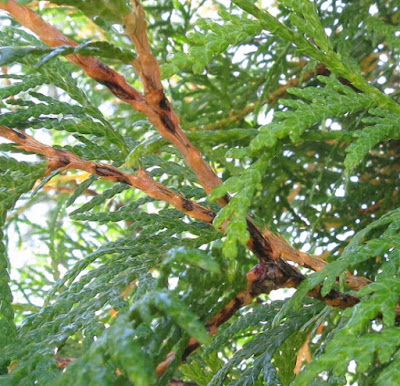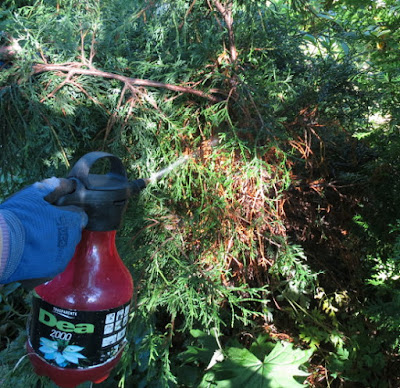Last week I came to my garden, I was surprised looking at the small thuya. I brought it up from cutting, I cared for it all the time. What did I see that day? Dry yellow foliage and stems at the foot of the thuja. Looking closely I saw long black lines and spots on the trunk and thin stems. I was very upset.
I should learn more about thuja disease. Reading on internet I've found the Royal Horticultural Society (RHS) site and there is a complete description of this problem. It said that 'Cypress aphid is one of the causes of dieback on conifers. It has become an increasingly problematic on conifer since the 1980s'. 'A useful confirmation of aphid damage is the presence of a black sooty mould on the stems and/or foliage, as there are other causes of dieback on conifers'.
This description was absolutely similar the picture I saw. A black powdery coating of sooty mould developed on the stems and foliage. The lower parts were more severely affected than the top.
'Damage is caused by brown aphids that are active from May to November. They suck sap from the stems and even quite light infestations can have a significant effect. They are difficult to see as their colour matches that of the bark'
I've taken the pictures to look closely at aphids at home. I learned Cypress aphid often cause a gradual drying up of the foliage, by late summer many of foliage will be brown and dead.
Then I decided to find the active treatment (chemical or natural) against Cypress aphids. Reading different sources I learned some preparations and their analogues in Russia. I've found the insecticide cypermethrin, called 'Intavir' (Интавир) here. There are no natural preparation against this filth.
I did solution as it is said, and sprayed ALL stems and foliage. I had to spray twice, so I repeated it yesterday.
Here is the result!










I hope the tree will safe. My lemon tree got a serious disease too, I have done hard pruning. Hoping it will work.
ReplyDeleteThank you Endah!
DeleteDear Nadezda,
ReplyDeleteit is really sad to see, that plants are ill, especially if it is a big one you can not change easily. I hope, you will suceed at last!
With Kind regards
Katharina
So do I Katharina. Thank you.
DeleteGlad you found a solution and hope it recovers fully.
ReplyDeleteIt must recover my thuja, Judy.
DeleteOhhh I hate aphids. Hope and believe that your Thuja will be recover.
ReplyDeleteGreetings. :)
I hate them too, Aga!
DeleteI look at my plants often, as sometimes little black sticky spots come on the leaves, especially lemon tree. Sooty mould is a problem too. The suggested spray here is White Oil.
ReplyDeleteVery annoying!
Do hope your tree responds to the treatment and will recover.
I should look at the thujas more often, I agree. It's my fault Betty.
DeleteMy garden is very small whereas your garden looks quite large. It does not take me long to look around and still sometimes I miss new infestations of aphids!!
DeleteEspero que pronto se recupere. Besitos.
ReplyDeleteYo espero tambien Teresa, gracias!
DeleteDear Nadezda, I'm so sorry that these pesky aphids have done so much damage to your beautiful thuja and hope that it will recover.
ReplyDeleteThis damage occurred once in 10 years, Peter. I must be more attentive to my plants.
DeleteI do hope that your plant survives. There seems to be an aphid that will colonise most plants.
ReplyDeleteI think so Sue and am afraid to see aphids on the other thujas.Have fingers crossed.
DeleteI hope the tree will be alright, so sorry to hear this, Nadezda.
ReplyDeleteThank you Linda!
DeleteHope the spray works and stops them in their tracks.
ReplyDeleteI bought more spray Molly and am ready to fight against aphids.
DeleteIndeed a problem, we had them in our conifers too. Hope the Thuja recovers, but the aphids are very tough and easily come back again. Wish you good luck.
ReplyDeleteI hope frost to kill them in winter, Janneke . But they can overwinter in the soil.
DeleteSorry to hear that. It makes me also mad when I loose a plant by diseases, frost or dryness. Don't these aphids have natural enemies? Wish for you that the treatment works and the thuja recovers.
ReplyDeleteI think this treatment works well Sigrid. However after one week I don't see live aphids.
DeleteAwesome work! Have a nice evening;-)
ReplyDeleteSometimes I think there are more diseases in trees and shrubs than before. Box and now thuja? I hope your thuja will recover. Groetjes Hetty
ReplyDeleteYou're right Hetty, now there are more diseases. I do hope my thuja recovers.
DeleteMany new pests and deseases are believed to be related to climate change and warm winters in our region. Do you think this is the case with Thuja aphid?
ReplyDeleteI hope your tree will be fine!
Perhaps you're right Tistou. The last ten years I've had no such problems with plants. The climate changes, it's true. These aphids didn't appear here when winters were very frosty. Now I hope frost will kill them.
DeleteWhat an awful disease. I hope your Thuja mends as soon as possible!
ReplyDeleteSo do I Jason, thank you!
DeleteSo glad that you found the problem and got a solution. The pests have been surviving the milder winters in many areas, where they used to decrease in population. I hope your trees will recover nicely.
ReplyDeleteI do hope too Lee. Forecast predict cold winter and maybe the pests won't survive in the soil and thujas will be OK next spring.
DeleteEspero que se recuperen las thujas. Es una pena cuando un árbol se muere, me da tristeza.
ReplyDeleteBuena semana! Un abrazo
Hello Dear Nadezda!
ReplyDeleteI hope that after your chemical spray your throat will grow healthy again.
Kisses and greetings.
Lucja
I hope your Thuja recovers quickly. Those aphids are insidious. You don't know they are there until you see the damage. It makes you feel worse when you have a lovely plant like this that you brought up from a little start.
ReplyDelete